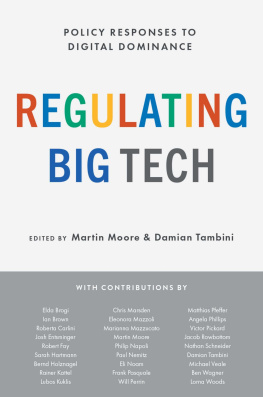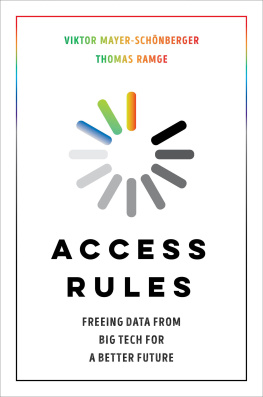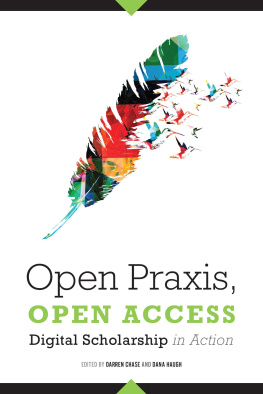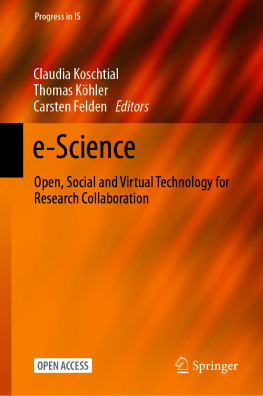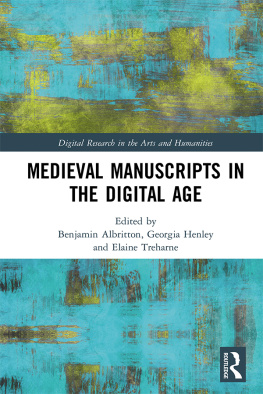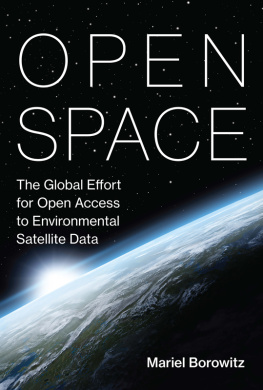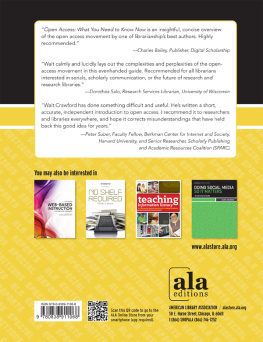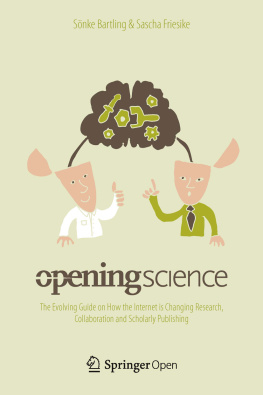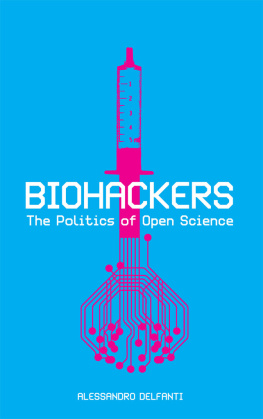Contents
Guide
Pagebreaks of the print version
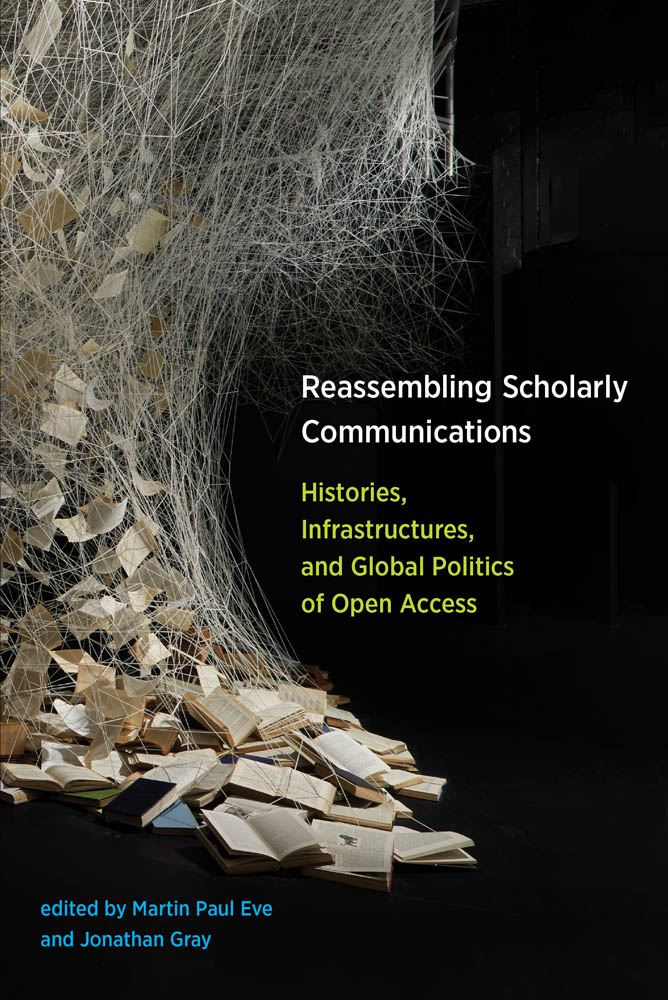
Reassembling Scholarly Communications
Histories, Infrastructures, and Global Politics of Open Access
Edited by Martin Paul Eve and Jonathan Gray
The MIT Press
Cambridge, Massachusetts
London, England
2020 Massachusetts Institute of Technology
This work is subject to a Creative Commons CC BY license.
Subject to such license, all rights are reserved.

The open access edition of this book was made possible by generous funding and support from Arcadia (a charitable fund of Lisbet Rausing and Peter Baldwin), the Open Society Foundations, the Open Knowledge Foundation, Birkbeck, University of London, and the Leverhulme Trust.


Library of Congress Cataloging-in-Publication Data
Names: Eve, Martin Paul, 1986- editor. | Gray, Jonathan, 1983- editor.
Title: Reassembling scholarly communications : histories, infrastructures, and global politics of open access / edited by Martin Paul Eve and Jonathan Gray.
Description: Cambridge, Massachusetts : The MIT Press, [2020] | Includes bibliographical references and index.
Identifiers: LCCN 2020000429 | ISBN 9780262536240 (paperback)
Subjects: LCSH: Open access publishing. | Communication in learning and scholarship. | Open access publishing--Social aspects. | Communication in learning and scholarship--Social aspects.
Classification: LCC Z286.O63 R43 2020 | DDC 001.2--dc23
LC record available at https://lccn.loc.gov/2020000429
d_r0
In memory of Professor William Gray (19522019)
Contents
- Martin Paul Eve and Jonathan Gray
- Thomas Herv Mboa Nkoudou
- Charlotte Roh, Harrison W. Inefuku, and Emily Drabinski
- Reggie Raju, Jill Claassen, Namhla Madini, and Tamzyn Suliaman
- Denisse Albornoz, Angela Okune, and Leslie Chan
- John Willinsky
- Robin de Mourat, Donato Ricci, and Bruno Latour
- David Pontille and Didier Torny
- Pamela H. Smith, Tianna Helena Uchacz, Naomi Rosenkranz, and Claire Conklin Sabel
- Aileen Fyfe
- Stuart Lawson
- Maura A. Smale
- John Holmwood
- Bethany Nowviskie
- April M. Hathcock
- Dorothea Salo
- Istvn Rv
- Jonathan Gray
- Penny C. S. Andrews
- Martin Paul Eve
- Arianna Becerril-Garca and Eduardo Aguado-Lpez
- Abel L. Packer
- Eileen A. Joy
- Dominique Babini
- Jane Winters
- Kathleen Fitzpatrick
- Martin Paul Eve and Jonathan Gray
List of Figures
Schematic representation of the editions of the AIME ecosystem.
Dual-pane view of fol. 4v in the digital critical edition, showing user-directed text comparison panes with pop-out commentary (editorial note at lower left of right pane) and a dropdown research essay (marked with the flask icon) that explains and reconstructs the recipe.
TAPoRware collocation analysis for the term gold*.
TAPoRware co-occurrence analysis for the terms gold* and gild*.
Voyant Tools graph showing distribution of terms gold* and gild across the manuscript.
Location of institutions receiving free copies of Royal Society publications in 1908.
Latin American journals indexed by Redalyc, Scopus, and WoS.
Data sources: Redalyc database (2018), Scopus Source Title (2018), Source Publication List for Web of Science: Science Citation Index Expanded (2017), Social Sciences Citation Index (2017), Arts & Humanities Citation Index (2017).
Latin American Social Sciences and Humanities Journals Indexed by Redalyc, Scopus, and WoS.
Knowledge representation of a journal article (RDF derived from JATS XML) based on the representation of the Linked Open Data Cloud.
Journal articles as part of the Linked Open Data Cloud.
SciELO Network collections.
Distribution of SciELO Network collections by start year, status, number of journals indexed, total of articles (May 2019).
Yearly increase in SciELO Network journals.
Yearly increase in SciELO Network articles.
SciELO Network quinquennial rate of growth.
SciELO Network collections coverage by major thematic areas and global visibility given by proportion of English articles and foreign authors, citations per document received in WoS ALL Database and presence in Scopus and SJR.
List of Table
Anonymity and identification labels in manuscript peer review
Grammatical and Terminological Notes
In this book, we spell the phrasal noun and postpositive compound adjective open access, the prepositive compound adjective open-access, and the heterogeneous group of individuals devoted to the advancement of open access, the Open Access Movement (although the extent to which there is a movement as such is a question that deserves ongoing scrutiny and empirical elaboration).
Contributors have used a variety of terms throughout this book to refer to the commonalities between Latin America, the Caribbean, the African continent, and elsewhere in a seemingly homogeneous bloc. Some of our contributors have preferred the term Global South, while others find this concept to be patronizing and simplistic and have used developing nations or developing countries instead.1 These latter variants, though, also have a potentially patronizing quality in suggesting a unified path to development that follows Anglo-American-European cultures, and so are disliked by others. Other possibilities that were not used include less economically developed countries, low- and lower-middle-income countries, and the majority world. Every single one of these terms has its own advantages and drawbacks. In this book, we chose to leave contributors free to select their own terms, particularly when authors culturally identified themselves with the regions they were describing. In our own editorial sections of the book, we have used the terms Global South and Global North to refer to a worldwide division in equity of wealth as a result of colonial legacies and ongoing prestige practices. We recognize that this editorial decision will appeal to some readers and meet with scorn from others. We apologize, in advance, to the latter group and hope that our sincere desire and advocacy for a more equal and just knowledge world can excuse our infelicities of language.
Contributor biographical statements, including titles, are presented as specified by authors rather than being subject to any stylistic unification.
Acknowledgments
This book has had a long gestation and the editors would both like to extend their thanks to the many individuals in the world of open access, its attendant conversations, and its often tricky implementations.
Martin Paul Eve would like to thank his colleagues at Birkbeck, University of London and, in particular, all those who have worked with him on the Open Library of Humanities: Caroline Edwards, Andy Byers, Rose Harris-Birtill, Mauro Sanchez, Helen Saunders, Paula Clemente Vega, and Marija Katic. Martin has also had tremendous support from academic colleagues in the School of Arts at Birkbeck, especially from Anthony Bale as Dean, Heike Bauer as Head of Department of English, Theatre, and Creative Writing, and Isabel Davis as Head of Research. Other individuals continue to inspire him with their intellects and generosity in the open-access and other research spaces, including Janneka Adema, Juan Pablo Alperin, Josh Bolick, Joe Brooker (for discussions about just blogging), Susan Bruce, Michael Collins, Geoff Crossick, Kathleen Fitzpatrick, Hilary Fraser, Rupert Gatti, Alex Gil, Gary Hall, Richard Hall, Patricia Hswe, Ben Johnson, Eileen A. F. Joy, Matthew Kirschenbaum, Stuart Lawson, Mark Leach, Alan Liu, Sam Moore, Ross Mounce, Cameron Neylon, Daniel ODonnell, Ernesto Priego, Rick Rylance, Johan Rooryck, Helen Snaith, Peter Suber, Demmy Verbeke, Don Waters, Peter Webster, and Jane Winters. The perils of such a list are, of course, that I have inevitably omitted people to whom I owe thanks and so I extend my apologies to those included in this sociology of absence. Thanks also from Martin to Gill Hinks, Ethel Gray, Rich Hinks, Alyce Magritte, Sue Eve-Jones, Juliet Eve, Lisa Holloway, Carin Eve, Anthony Eve, Julia Eve, and Sam Jones. Martins greatest and final thanks go, though, to his wife, Helen.


